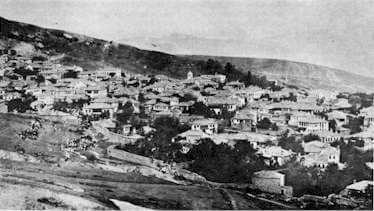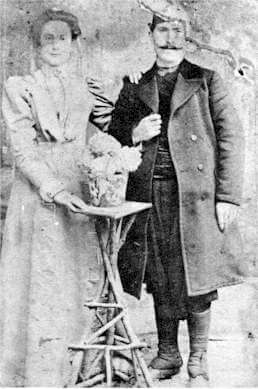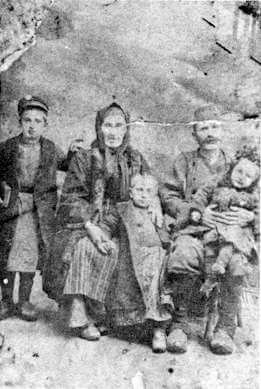How I Became Interested in My Ethnic Background

First, some family back-ground: My mother’s maiden name was Mariana McCombs. The fourth of six children, she was of mixed British and Germanic background. My father’s name is Anastas Thomas Rushaki. He was the first of six brothers; his father came from Magarova, his mother from Krushevo (both now in Yugoslavia).
Being the first grandchild born on my father’s side created a special bond between his parents and myself. As far back as I remember, I perceived two unique characteristics which distinguished them from my mo-ther’s parents and my friends’ grandparents: they ate other kinds of food and they spoke a different language among them-selves and to their sons.
My grandfather was retired and spent his time making the rounds of visits to his friends and if I was free, I would al-ways go with him. I also recall taking the bus in Columbus, Ohio, with my grandfather to what I remember as dark, sinister, smoke-filled rooms with lots of tables with men talking loudly while playing cards. I would be given a table where I would play with what seemed like an infinite number of dominoes. This place was the coffee-house. Grand memories.
When I entered the second or third grade, I began to enquire about the background of my father and his parents:
Q: “Where are they from?”
A: “Yugoslavia.”
Q: “What do they call them-selves?”
A: “Macedonian.”
Q: “Which church do they attend?”
A: “Greek Orthodox.”
Q: “What language do they speak?”
A: “Arumaneashti.“
Q: “What is Arumaneashti?”
A: “It’s like Rumanian.”
Myself: “OK. I understand.”
Of course, I really didn’t understand — at that point I probably saw myself as some sort of crazy mixture like chop suey or ghela. My grandfather died when I was 11; my grandmother suffered a stroke and thereafter lost her speech. I therefore lost what little ethnic consciousness I had until I was 22.
In my junior year at Black Hills State College in South Dakota I had a professor named Stephen Gazi (who incidentally is mentioned on page 45 of Tom Winnifrith’s recent book on the Vlachs). On the first day of class he gave a brief profile of himself, a Croatian who had come from Yugoslavia. When it came my turn to give a profile I mentioned that my father and his parents came from Yugoslavia. “What part?” he asked. I had to think; my hesitant reply was, “Macedonia?
“Aha; do you know about the Macedonian Question?” Dr. Gazi asked.
“No, I have never heard of it,” I responded.
“Hmmm…Did your father or his parents retain their native language?”
“Somewhat,” I replied, “but it had a different, ah, name.” I had to pause and think for a moment. Then it hit me: “Yeah — they called it Arumaneashti.”
Dr. Gazi’s eyes lit up. “Yes, then you are a Vlach!”
“A what?”
“A Vlach. See me after class if you wish.” I did meet with Dr. Gazi and he began to inform me about my unique heritage.
Since that day I have made an effort to learn the Whos, Hows, Whys, and Wherefores of our people. I discovered Wace & Thompson’s book in a Greek Orthodox Church in Cleveland, Ohio eight years ago. I met with the priest of the Rumanian church in Akron, Ohio, Father Lawrence Lazar, who had served in the Rumanian church in Bridgeport when he was a deacon. It was he who informed me that there was a fair number of Macedo-Rumanians in the area of New York and Connecticut.
Five years ago I found out that cousins of my grandfather had once belonged to an organi-zation of Macedo-Rumanians called “Bitolia” which has since ceased to function. I began to attend services and ethnic functions of the Orthodox churches in the Akron and Cleveland (Ohio) area to discover Aromanians who were hidden in other backgrounds. I have made (and still make) at-tempts to discover my grandparents’ old friends and “lost relatives” who once spoke or still speak Arumaneashti.
I’ve been to Bridgeport twice. During the first trip three years ago I discovered that an Aromanian who is a professor of languages at Mt. Union College (Vasile Calesi) lived a mere 20 miles from my own house. The second trip produced insight into the Society Farsarotul and its functions. What sold me on the Society is its effort to present Aromanian culture on a level that the younger, Americanized generation of Aromanians like myself can comprehend and appreciate.
I am proud to be an Aromanian!n
Donovan Thomas Rossiaky was born on October 2, 1952 in Lake Benton, MN. He has a Bachelor of Science degree in Secondary Education from Black Hills State College in Spearfish, SD. He currently resides in Stow, Ohio, where he is a Warehouse Distribution Supervisor.
The Rossiaky family and their hometown of Magarova.
 |
 |
|
|
|
“I find it absolutely startling that I’m asked the question, ‘Do we, American Jews, have the right to express our views?’… I can’t imagine that someone answers, ‘Yeah, but the goyim [non-Jews] might hear the Jews.’ That just drives me up the wall. That’s ghettoism, that’s self-abasement. Of course they should hear you criticize. It is the silent ones who degrade our name. And it is the ones who are outspoken who salvage whatever there is to salvage.”
—Abba Eban



Responses